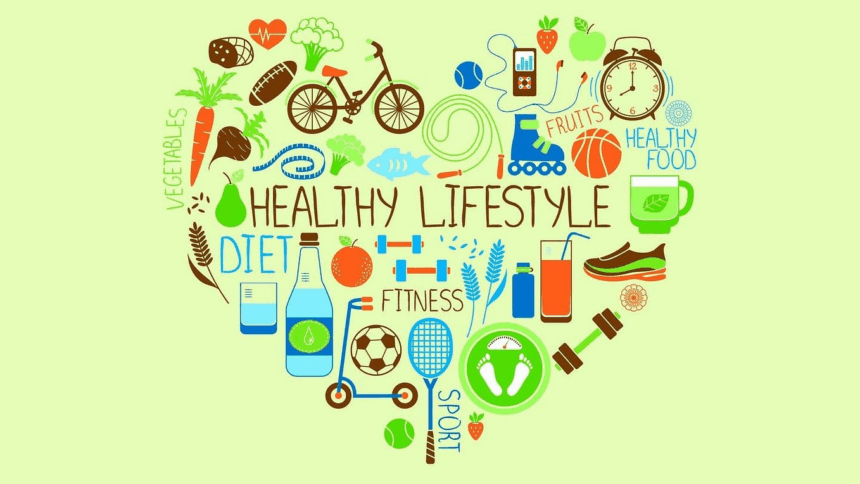Living a balanced and healthy lifestyle is not about following strict diets or spending hours in the gym every day. Instead, it’s about finding harmony between your mind, body, and soul — and making small, consistent choices that improve your overall well-being. In today’s fast-paced world, many people struggle to maintain balance. Between work, family, and social obligations, health often takes a back seat. But the truth is, you don’t need a complicated plan to live a healthy and happy life — you just need the right mindset and habits.
This article will guide you through simple, practical ways to achieve balance in your daily life — covering nutrition, exercise, mental health, sleep, relationships, and self-care.
🌿 Understanding What a Balanced Lifestyle Means
A balanced lifestyle means giving proper attention to all aspects of your well-being — physical, mental, emotional, and social. It’s not just about eating healthy foods or avoiding junk; it’s also about managing stress, maintaining relationships, getting enough rest, and finding joy in everyday life.
When your life is balanced:
- You have more energy and focus.
- You feel mentally and emotionally stable.
- You build stronger relationships.
- You experience greater happiness and fulfillment.
Balance doesn’t mean perfection — it’s about progress, flexibility, and making choices that align with your goals and values.
🥗 1. Eat Mindfully and Nourish Your Body
Your diet plays a vital role in your overall health. Instead of following fad diets or skipping meals, focus on balanced nutrition.
Simple steps to eat better:
- Choose whole foods: Fill your plate with fruits, vegetables, whole grains, and lean proteins.
- Stay hydrated: Drink enough water throughout the day. Limit sugary drinks and soda.
- Avoid overeating: Listen to your body’s hunger signals. Eat slowly and stop when you feel satisfied.
- Limit processed foods: Packaged snacks, fast foods, and fried items can harm your health in the long run.
- Plan your meals: Preparing meals in advance helps you avoid unhealthy last-minute choices.
A healthy diet is not about restriction — it’s about balance and variety. Enjoy treats occasionally, but make nutritious food your daily routine.
🏃♀️ 2. Make Physical Activity a Habit
Exercise is not just for losing weight — it’s essential for maintaining overall health, improving mood, and increasing energy levels. You don’t need to join an expensive gym; even 30 minutes of daily movement can make a huge difference.
Try these easy ways to stay active:
- Go for a morning walk or jog.
- Do home workouts using bodyweight exercises like squats, push-ups, or planks.
- Join a dance or yoga class to make exercise fun.
- Take the stairs instead of the elevator.
- Play outdoor games with friends or family.
The key is to find activities you enjoy so that exercise feels like pleasure, not punishment. Consistency is more important than intensity.
😌 3. Manage Stress and Prioritize Mental Health
Mental well-being is just as important as physical health. Stress, anxiety, and negative thoughts can drain your energy and affect your quality of life. Learning to manage stress helps you stay calm and focused even during tough times.
Tips for better mental balance:
- Practice mindfulness or meditation: Just 10 minutes a day can calm your mind.
- Take regular breaks: Step away from screens and breathe deeply.
- Express your feelings: Talk to someone you trust or write in a journal.
- Do something creative: Painting, cooking, or music can relax your mind.
- Seek help when needed: Don’t hesitate to consult a therapist or counselor.
A healthy mind creates a healthy life. When your thoughts are clear and positive, your body naturally feels lighter and more energized.
😴 4. Get Enough Rest and Quality Sleep
Many people underestimate the importance of sleep. But a good night’s rest helps your body recover, improves concentration, and boosts your mood. Adults need 7–9 hours of quality sleep each night.
Sleep better by:
- Setting a regular sleep schedule — go to bed and wake up at the same time daily.
- Avoiding screens before bedtime (phones, laptops, or TV).
- Creating a calming sleep environment — dim lights, clean sheets, and a quiet room.
- Limiting caffeine and heavy meals before sleeping.
Remember: rest is not laziness — it’s essential for your physical and emotional recovery.
💬 5. Build Strong Social Connections
Human beings thrive on connection. Spending time with loved ones boosts happiness, lowers stress, and improves emotional resilience.
To strengthen your social life:
- Spend quality time with family and friends.
- Communicate openly and listen actively.
- Join community events or volunteer work.
- Surround yourself with positive people who inspire you.
Balanced living means nurturing relationships that bring you joy and support. When you feel connected, your overall health improves naturally.
💖 6. Practice Self-Care Regularly
Self-care is not selfish — it’s a necessary part of living well. It includes anything that helps you recharge physically, mentally, or emotionally.
Examples of self-care:
- Taking a relaxing bath
- Reading a good book
- Spending time in nature
- Practicing gratitude
- Saying “no” when you need rest
Take at least 15–30 minutes daily to focus on yourself. Even small acts of self-kindness can reduce burnout and improve your outlook on life.
🧘 7. Keep a Positive and Growth-Oriented Mindset
A healthy lifestyle begins in the mind. Positive thinking helps you stay motivated, overcome challenges, and stay consistent with your habits.
How to develop a positive mindset:
- Focus on progress, not perfection.
- Celebrate small wins instead of criticizing failures.
- Surround yourself with positivity — read inspiring books, listen to motivational podcasts, and spend time with uplifting people.
- Practice gratitude daily — write down 3 things you’re thankful for.
When your attitude changes, your life follows. Positivity attracts peace, health, and happiness.
⚖️ 8. Find Your Work-Life Balance
Many adults struggle to balance career demands with personal life. Working too much without rest can lead to burnout, fatigue, and poor health.
Ways to maintain work-life balance:
- Set clear boundaries — avoid checking emails after work hours.
- Take short breaks during work to stretch or walk.
- Plan vacations or weekends off to recharge.
- Prioritize family time — relationships matter more than deadlines.
Balance doesn’t mean doing everything at once; it means knowing what truly matters and giving time to what adds value to your life.
🌼 Conclusion
Living a balanced and healthy lifestyle is a lifelong journey, not a one-time change. It’s about creating habits that support your body, calm your mind, and nourish your soul. By eating right, exercising regularly, managing stress, sleeping well, building relationships, and caring for yourself — you’ll enjoy a happier, more fulfilling life.
Remember, small daily choices create big long-term results. Start with one change today — drink more water, go for a walk, or take a break to breathe deeply. Step by step, you’ll discover that balance isn’t something you find — it’s something you create.
❓FAQs About Living a Balanced and Healthy Lifestyle
1. What is the first step to living a balanced lifestyle?
Start small. Begin by improving one area — like drinking more water or sleeping earlier — and build from there. Consistency is key.
2. How can I stay motivated to maintain a healthy lifestyle?
Set realistic goals, track your progress, and reward yourself for small wins. Also, surround yourself with supportive people.
3. Can I live a balanced life without going to the gym?
Absolutely! Walking, yoga, cycling, or even dancing count as exercise. The goal is to stay active, not necessarily join a gym.
4. How does stress affect a balanced lifestyle?
Chronic stress can lead to fatigue, poor eating habits, and mental burnout. Managing stress through mindfulness and relaxation is essential.
5. How long does it take to see results from lifestyle changes?
You may start feeling better within a few weeks, but lasting results take time. Focus on building habits you can maintain for life.











